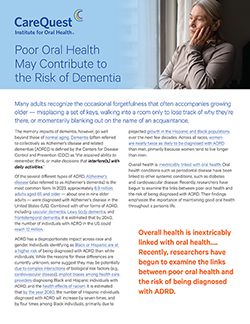This visual report from CareQuest Institute examines current research on the links between poor oral health and the risk of being diagnosed with Alzheimer’s disease and related dementias (ADRD). It is estimated that by 2040, the number of individuals with ADRD in the US could reach 12 million, making it critical to determine whether improvements in oral health may prevent or reduce the symptoms of this disease.
Is there a link between oral health and dementia?
Highlighted research findings include:
- Adults aged 50–80 with Alzheimer’s disease have worse periodontal (gum) health than their peers without Alzheimer’s, including more plaque, more bone loss around the teeth, and more gingival bleeding.
- Tooth loss from gum disease or tooth decay is linked with a higher risk of being diagnosed with ADRD.
- Individuals with ADRD — including those living in long-term care facilities — are at increased risk of poor oral health, due to challenges with maintaining oral hygiene and accessing professional oral health care.
- Minimally invasive treatments may be useful to treat and prevent caries for adults with ADRD who are unable to receive care in a dental office.
You may also be interested in:
- Oral-Systemic Interactions and Medical-Dental Integration: A Life Course Approach, a report that provides a comprehensive overview of the bidirectional nature of oral and systemic diseases and discusses how medical-dental integration can improve access to care and health outcomes.
- Uninsured and in Need, a report that examines why 68 million people in the US lack dental insurance, including older adults who are most likely to be uninsured.
- Minimally Invasive Care in Dentistry: Healing Tooth Decay with Brush-On Therapies, a self-paced, online course that introduces therapies that can reduce dental anxiety and be delivered by a variety of providers. Eligible for one free CE credit.
